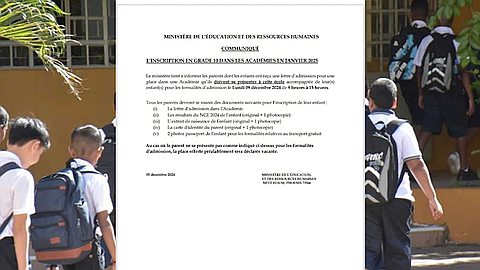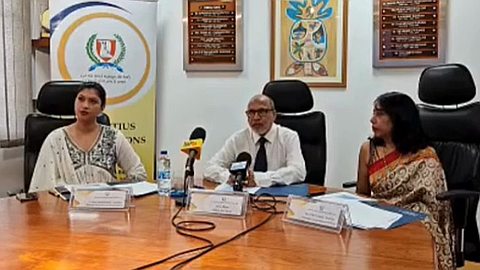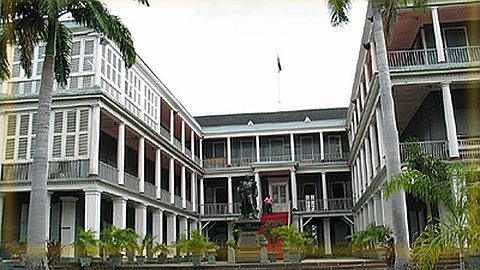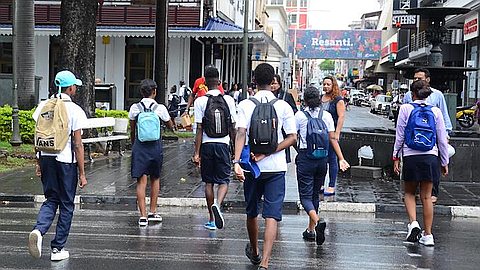Maurice Demain: Enseignement Supérieur : à la Croisée des Chemins
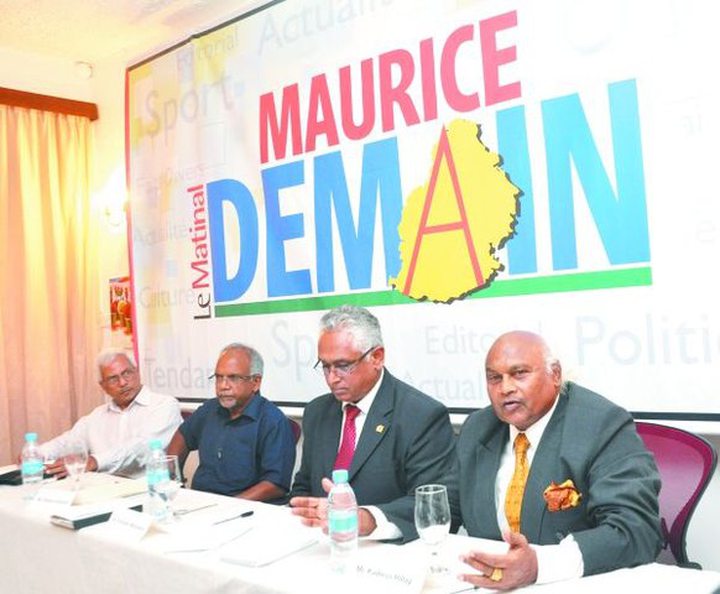
Today Mauritius, several foreign universities were added to the list of universities to enable more young people to continue their studies. Many questions arise about the positive or negative developments in this sector.
To discuss higher education is seen as a backbone for the country's future, The Early Bird organized the second edition of its discussion forum "Maurice Tomorrow" on Monday afternoon. Dan Maraye, former Governor of the Bank of Mauritius, Dharam Gokhool, former Minister of Education and Kadress Pillay, President of the National Empowerment Foundation, and former Minister of Education, were invited to share their thoughts on this subject. The moderator of the debate was Praveen Mohadeb, former Director General of the Tertiary Education Commission (TEC). The debate was attended by teachers and observers of higher education. This forum focused on three main aspects, including the state of the place of higher education, the vision for this sector and how to achieve and the challenges facing us in the near future.
Dharam Gokhool: "The financing of higher education is a real problem"
Browsing the sector education than since 1975, Dharam Gokhool concerned that this sector has not seen the development need because of a lack of funds. "The demand for a" Knowledge Economy "requires large investments," said Dharam Gokhool. Move from one system to another requires large investments. More and more young people want to pursue their higher studies. According to him, we must find new sources of funding while consolidating the gains to engage in new economic and social sectors. For him, the funding model has not changed and directly affects the quality of education.
"We tend to attach great importance to quantity and not quality. It is important to give importance to quality, "he said. For him, the current paradox is to see how we can preserve the quality? For the former Minister of Education, higher education is now at a crossroads as the model for economic development from independence has changed. The economy is now "knowledge driven" because the parameters have changed and it is important to offer programs that strengthen its human capital.
Dharam Gokhool adds that we should not set aside the competition and it is important to spend a fierce competition to healthy competition. "The architecture of tertiary education includes many institutions and more than 800 degree programs are offered to students. To date, universities welcome 50,000 students in 2025 and the vision is to have 70,000 students. "Remembering 1968, the year of independence to the present, Dharam Gokhool argues that the education accompanied the economic and social development of Mauritius. "Every government has contributed in this highly controversial, dynamic and complex sector where there is never a consensus," he said. He suggests that Mauritius is a 'Case Study' from other countries regarding the influence of investment and policy choices on human capital and socio-economic development of the country. For the former minister, the $ 12,000 income per capita shows an impressive track record on the socio-economic development.
According Dharam Gokhool, the issue of higher education is not affected by the policy choices but also a problem of leadership. "Know how to position the sector of tertiary education in a global context to align the requirements of a world where technology is present in all sectors," he said.
To consolidate the sector of higher education, Dharam Gokhool concedes that there is a phase difference between the defined strategies and their implementation. Research, according to him, is a poor parent who is not sufficiently funded. On the issue of leadership in university, Dharam Gokhool said it takes "the right person at the right place" to properly run a university. To him we can not have universities in Mauritius based on older models but it must have virtual universities using technology.
Among the challenges, Dharam Gokhool advance need a Ministry of Economic Planning and Development that will guide the government's priorities. "Without a central authority to channel decisions and policies, there will be no coordination and objectives will not align with national priorities," he said. Dharam Gokhool regrets the lack of a National Think Tank for this sector must strengthen institutions such as the Human Resource Development Council (HRDC), the National Economic and Social Council (NESC), the National Productivity and Competitiveness Council (NPCC ), the Mauritius Research Council (MRC), the Mauritius Qualifications Authority (MQA) to avoid waste.
For Dharam Gokhool, higher education is currently at a crossroads and the person who will support this sector shall not introduce too many changes to this area. The government must find the right person to help manage this department.
Dan Maraye: "The higher education sector tumbles"
At the conference, Dan Maraye economist and former governor of the Bank of Mauritius, said that our education system has deteriorated further since the introduction of a Ministry of Higher Education. The University of Mauritius (UoM) and the University of Technology (UTM) are prime examples. "If there is a commission of inquiry into the UTM, several people who held key positions are likely to experience some trouble." He also mentioned the controversy surrounding the higher education institutions, according to him, have tarnished the country's image. Many families do not have the resources to provide quality education to their children who want to study at universities abroad.
Dan Maraye, which is at the head of the Glamis Business School for over 15 years, said that 264 already have a graduation. The majority of them, who have completed a "Level Bachelor and Master" already working.
40 years ago, only the best components were entitled to a scholarship and could go abroad to continue their studies. "Today, we do the opposite in Mauritius. With the establishment of a Ministry of Tertiary Education, we encourage the deficit amount of quality. 90% of tertiary institutions who settle in Mauritius are universities fourth grade, "he said. He recommends that parents send their children to the top 20 universities worldwide. "Charity begins at home," said Dan Maraye. We know that in some universities, there are problems of management, quality and results. "The government must conduct a thorough audit of the quality of existing resources in universities and make good decisions in the future."
Kadress Pillay share the same opinion that Dan Maraye the term 'institutional decay. "Many graduates think that a certificate is enough to have a job in the public sector," he said. "You need more collaboration between tertiary institutions and employers," he added. "Employers should encourage employees to continue their learning and studies to support the company in the future," he said. According to Dan Maraye, a country is better managed by those who make great sacrifices and who are disciplined unlike those who have all the facilities. Banks must also be careful before granting loans to students. He asked that there is more flexibility and requires employers to offer scholarships to those who do not have the means to pursue their tertiary education.
Kadress Pillay: "This is serious"
Kadress Pillay, President of the National Empowerment Foundation and former Minister of Education, has made many reflections on graduates who have taken courses in Mauritius universities. According to him, "the situation is serious." He pulls the alarm and said he must find a solution. "I meet every day of graduates who come to save the NEF. We have in our 'database' nearly 1,500 graduates who are unemployed, "he has said. Working with 80% of graduates Mauritian or foreign to the NEF, said he feared for the future of the country. "I notice a huge deficit compared to what their certificate shows and what it actually represents in terms of contribution to the work," he said. "In the Mauritian society is the amount that is privileged. We do not give importance to the quality of education, "he added. He also referred to the cases of UoM and UTM. In writing the constitution of the UTM in 1998 with his collaborators, he recalls that many people were against the introduction of a second tertiary institution in Mauritius. "But, my argument was that the academic culture of UOM was exceeded." According to him, it was necessary to establish an institution that has an academic culture and technological contribution, "he has said.
It is also against the term 'knowledge based development', because in today's world, knowledge becomes obsolete in favor of the new technology. Kadress Pillay was also a nod to the intellectuals of yesteryear. "People have the impression that these are the foreign investment that drove us, but having worked in the post independence civil sector, I can tell you that I rubbed the best minds that Mauritius has known intellectuals monuments" Kadress tells Pillay. "Many people who hold key positions in universities do not really have a good concept of leadership. Thus they provoked this institutional decay that has plagued our society, "he said. For him, "a license or master is not a passport to paradise." "Every Mauritian forge its future in relation to the character it develops, its accumulated knowledge and the ability to reject this knowledge when it becomes obsolete." Many young people who are at the bottom of the ladder and face financial problems n 'unable to find a place in universities. For him, the creation of intellectual dynamics of the region would best HSC students have automatic access to the University of Mauritius.
